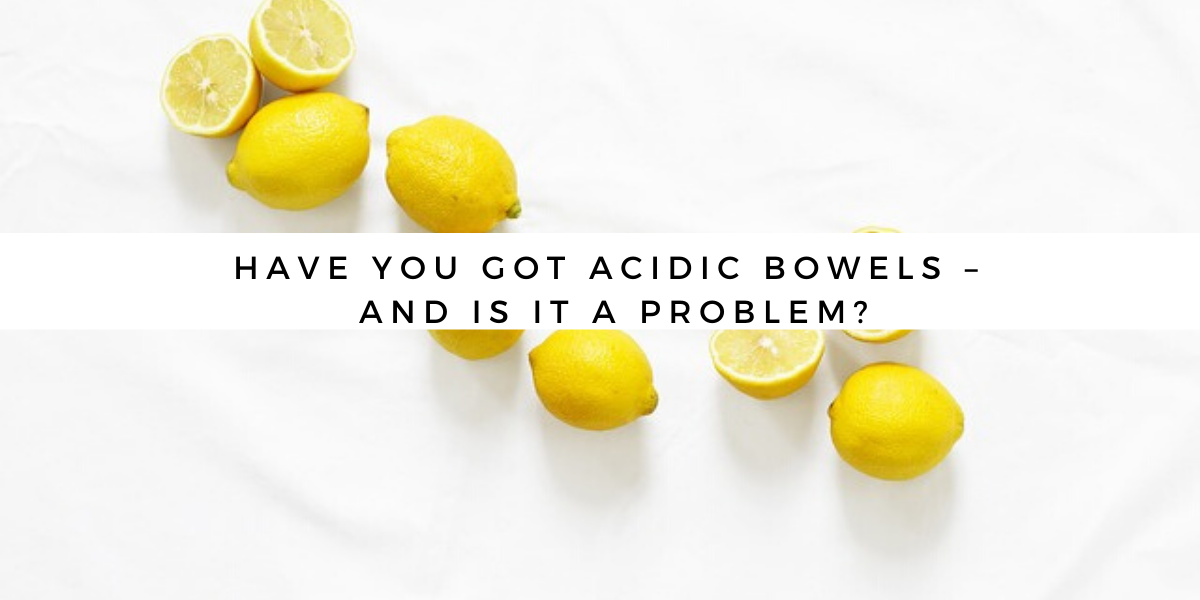Acidic bowels…you’d be surprised how often patients use this expression with me in clinic. They are usually talking about how some bowel motions feel painful or unpleasant, describing it as a feeling of “acidic bowels”. I learn a lot about how to help people from their symptom descriptions…but when it comes to the acidic bowels term, I don’t take it literally. At the same time, it’s an incredibly important concept. Why? Let me explain.
Remember high school science and pH? pH refers to how acidic or basic something is, rated from very acidic (0) to very basic (14) with water at neutral (7). A very low pH would be hydrochloric acid (0), and a very high pH would be something like lye (13) or ammonia (11).
What about in the body?
Well, the pH of gastric acid, which breaks down food in the stomach and digests protein, is 1. This is a stark contrast to the pH of blood (7) or urine and saliva (about 6). So should you have acidic bowels or not? Is an acidic bowel motion a bad thing?
Let’s follow the pH of the food as it moves through the gut and eventually becomes your bowel motion. At the top of the gut, in the stomach, we know the pH is 1 due to the acid. When the food mixes with this, it “waters it down” and the pH increases. When it moves into the small intestine, the pH increases further (that is, it becomes neutral to basic) due to the secretion of bicarbonate by the pancreas to help digest the food. As it moves into the first part of the large intestine, the caecum, it becomes more acidic. That is, the pH drops again, only to rise through the rest of the colon (transverse, descending, and sigmoid). In the rectum, the contents – that is, the stools or the bowel motion – may become more acidic or may remain more alkaline.
So why does it matter for your health?
Well, back in 1981, research suggested that a higher colonic pH helped promote production of carcinogens in the bowel – that is, cancer-causing substances – and that eating fibre, through its production of short-chain fatty acids, could hamper this process.
We know from research that slowing down the gut increases the pH, so sluggish bowels are not a good thing (speeding up the bowels with either bran or senna, a laxative, drops the pH). As well as wheat bran and oat bran, bulking agents like psyllium husk and prebiotics like lactulose also reduce colonic pH, which might explain some of their benefits for gut health.
So a lower colonic pH (i.e. a more acidic colon) seems to represent a healthier gut.
At the same time, it’s not simple. Colonic pH is actually lower in certain gut conditions, including irritable bowel syndrome and active ulcerative colitis, a type of inflammatory bowel disease.
But overall, you do actually want acidic bowels!
And the good news is you can change this fast by increasing your fibre – and on the flip-side, if you drop your fibre back you will lose the benefits within a couple of weeks. Generally, acidic bowels are a good thing. If you have inflammatory bowel disease, though, you’ll need to discuss this in more detail with your bowel-savvy health professional. If you have irritable bowel syndrome, you still need to work with a clinician on improving markers of gut health, even while trying to reduce symptoms (that is, it’s not the answer to give up eating fibre altogether just so you never have any wind or bloating).
And finally, what is actually going on with my patients who are bothered by what they call “acidic bowels”?
Well, there’s no one answer here. They might have a fissure or other mucosal irritation. They might actually have had an unusually acidic bowel motion due to fast transit or diarrhoea. Or, they may even have the opposite – a bowel motion that is more basic or alkaline. The sensitive tissue of your bowels, called mucosa, contains chemoreceptors. These are sensors that detect change in pH, or acidity. It is possible that a pH that is too high or too low may be sensed as danger by the body. Regardless, if you have this annoying symptom that feels like “acidic bowels”, you need to find a practitioner who is able to problem-solve this with you.
Hope you enjoyed this insight into pH of the bowels. If you are a clinician, you may be interested in my online course for health professionals, Insights Into Insides, where you will gain exactly that. E-mail us to register your interest for the next round of the course, and until then, be sure to take care of your bowels.

